

Modal verb. A modal verb (also 'modal','modal auxiliary verb', 'modal auxiliary') is a type of auxiliary verb that is used to indicate modality – that is, likelihood, ability, permission, and obligation.[1] Examples include the English verbs can/could, may/might, must, will/would, and shall/should.
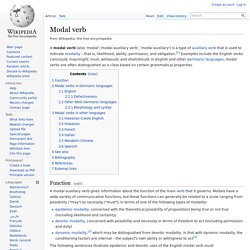
In English and other Germanic languages, modal verbs are often distinguished as a class based on certain grammatical properties. Function[edit] A modal auxiliary verb gives information about the function of the main verb that it governs. Modals have a wide variety of communicative functions, but these functions can generally be related to a scale ranging from possibility ("may") to necessity ("must"), in terms of one of the following types of modality: The following sentences illustrate epistemic and deontic uses of the English modal verb must: epistemic: You must be starving. An ambiguous case is You must speak Spanish. Modal verbs in Germanic languages[edit] English[edit] Defectiveness[edit] a. B. A. B. List of Interactive Quizzes. The quizzes with a magenta marble are also listed within the section or digital handout to which they apply.
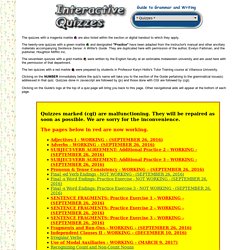
The twenty-one quizzes with a green marble and designated "Practice" have been adapted from the instructor's manual and other ancillary materials accompanying Sentence Sense: A Writer's Guide. Uses of English verb forms. This article describes the uses of various verb forms in the English language.
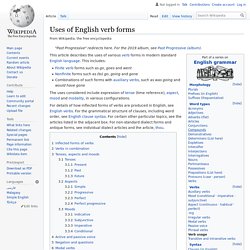
Word Order, Position & Inversions. Lessons for Beginning English Learners. Count and Non-Count Nouns - Understanding Nouns What are Countable Nouns? Grammar A–Z. Some grammatical terms may be familiar to you, but others can be confusing or hard to remember.
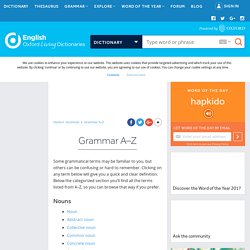
Clicking on any term below will give you a quick and clear definition. Below the categorized section you’ll find all the terms listed from A–Z, so you can browse that way if you prefer. abstract noun A noun which refers to an idea, quality, or state (e.g. warmth, liberty, happiness), rather than a physical thing that can be seen or touched.
Compare with concrete noun. active. The Most Effective English Study Techniques. Here are some helpful guidelines as to how to study that should help you vary your approach and improve more quickly.
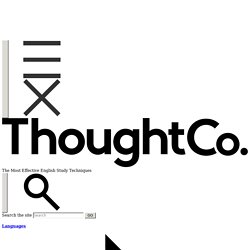
Study Every DayIt's important to study English every day. However, don't exaggerate! Study for thirty minutes every day instead of two hours once a week. Short, steady practice is much better for learning than long periods on an irregular basis. This habit of studying English every day will help keep English in your brain fresh.A Little Grammar, a Little Listening, a Little Reading, and a little WritingNext, make sure to study a number of areas rather than focusing on just one topic. Warming-up to Study English Just as there are exercises to help you warm up before you play some basketball or other sport, there are exercises which can help you warm up to study English. Activating Your VocabularyActivate your vocabulary by thinking or speaking briefly about the subject you are about to work on. More Ideas on How To Improve How To Improve Your Pronunciation. Some, any, every and no. Daisy: Shall we look for somewhere to get some coffee and some cake?
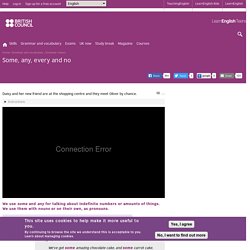
Amy: Alright. I'm not very hungry, but I'd love something to drink. Where do you fancy going? Free Books : Download & Streaming : eBooks and Texts. Community Texts Jan 24, 2017 by Oxford Guide To English Grammar texts eye favorite 4 comment 0.
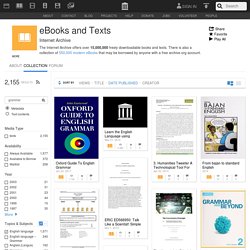
OUP Companion web site:Test Your Grammar. Speaking Apps. Expressing preference. 21 Digital Tools to Build Vocabulary. If you follow this blog, you know that I believe effective vocabulary instruction is just about the most important instructional activity for teachers to get right.
For lots of reasons. Vocabulary influences fluency, comprehension, and student achievement. How’s that for starters? In addition, a broad vocabulary is important for effective speaking, listening, reading and writing. Vocabulary is a foundational component of an effective K-12 comprehensive literacy framework. I write frequently about the importance of effective vocabulary instruction and my recent infographic – the 10 Do’s and Don’ts of Effective Vocabulary Instruction – has proved very popular having been Pinned over 31,000 times. In today’s 21st century classrooms, digital tools must coexist alongside more traditional tools.
Digital tools have advantages. The following digital tools show promise to support word learning, review, and playing with language. 21 Digital Tools to Build Vocabulary Reference Tools 1. 2. 3. 4. 5. Tanévkezdés digitálisan. BusyTeacher: Free Printable Worksheets For Busy English Teachers. Databases and Useful free resources - in English. Gamification. THE FOUR SKILLS (reading, writing, speaking, and listening) English On The Go Ep 6: Loose or lose. English Language Exercises & Tests. Practise English grammar. LingualNet - Learning English Through Media. English Vocabulary. Online courses from British Council. Fill up, fill out or fill in: what's the difference? - Learners' Questions: You ask, we answer! Modals of Preference.
English by Level. English QnA. Grammar and Style Guides. English Verbs. Formal and Informal English. Fluency. Writing Examples, Samples. Adjectives & Adverbs. Daily Writing Tips. Daily Writing Tips. Daily Writing Tips. Reported Speech. English YouTube Channels.